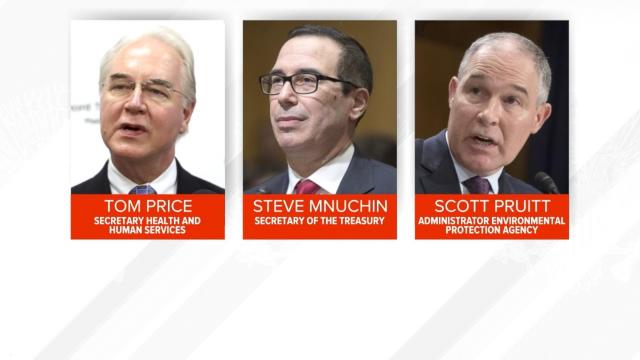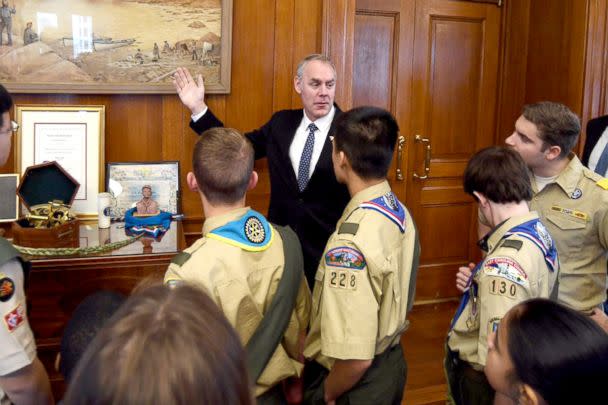ThinkProgress
EPA happy to waive ethics rules for industry lobbyists joining the agency
Nearly half of the political appointees at Trump’s EPA have strong industry ties.
Mark Hand March 9, 2018
 EPA Administrator Scott Pruitt. Credit: Tom Williams/CQ Roll Call
EPA Administrator Scott Pruitt. Credit: Tom Williams/CQ Roll Call
President Donald Trump’s executive order on ethics, signed one week after his inauguration, has not stopped the administration from appointing lobbyists and industry officials to key positions at the Environmental Protection Agency (EPA) and other government agencies.
Trump’s order mandated that any political appointee who worked as a registered lobbyist within two years of their appointment be barred from participating in any matter related to their previous job. According to a new Associated Press report, though, nearly half of the political appointees hired by the EPA in the first year of the Trump administration have strong industry ties, creating serious concerns about conflicts of interest.
The AP report shows that Trump administration has either blatantly ignored the executive order or granted waivers to former lobbyists that allow them to work on issues involving their former clients.
The administration’s hiring of large numbers industry lobbyists — and then granting them ethics waivers so they can work on issues related to their former clients — also violates Trump’s pledge during the presidential campaign to “drain the swap” of the revolving door of government and industry officials. Needless to say, the astounding number of former industry officials and lobbyists brought on board by Trump has only worsened, not improved, Washington’s corporate lobbying and corruption problems.
Influx of anti-regulation political appointees turns EPA’s mission on its head

Craig Holman, who lobbies in Washington for stricter government ethics and lobbying rules for advocacy group Public Citizen, told the AP that not only are key provisions simply ignored and not enforced, when in cases where obvious conflicts of interest are brought into the limelight, the administration readily issues waivers from the ethics rules.
The EPA released a report earlier this week that listed EPA Administrator Scott Pruitt’s “accomplishments” over the past year. As summarized by Alex Formuzis at the nonprofit Environmental Working Group, the report lauded the EPA’s decision to stop the ban of a pesticide that the agency’s own scientists wanted banned because it causes brain damage in children. Pruitt bragged about rescinding a rule to protect streams that provide drinking water for millions of Americans. In the report, he also proudly looked back at his push to repeal the Clean Power Plan, the Obama administration’s landmark rule to reduce greenhouse gas emissions for power plants.
Pruitt’s environmental rollbacks could not have happened without the help of the agency’s industry-linked political appointees. ProPublica has tracked the total number of lobbyists the Trump administration has hired and puts the count currently at 187, many of whom have been appointed to positions in which they can do favors for the clients they used to represent.
One blatant example at the EPA is the hiring of Erik Baptist, who worked until 2016 as a registered federal lobbyist for the American Petroleum Institute, the top trade group for the oil and gas industry, where he pushed Congress to repeal the Renewable Fuel Standard. Baptist now works as a top EPA lawyer who was granted approval by White House counsel Don McGahn to advise Pruitt on issues surrounding the renewable fuel law.
AP reporters reviewed records that showed McGahn has issued at least 24 ethics waivers to top administration officials at the White House and executive branch agencies. The waivers were signed months ago, but the Office of Government Ethics disclosed several of them on Wednesday.
Given how many waivers have been granted over the past year, Holman said he believes Trump’s pledge to drain the swamp was little more than campaign rhetoric.
Ethics rules were much stricter under President Obama whose administration issued about 70 waivers during his eight years in office. The waivers were more narrowly focused and offered a fuller legal explanation for why the waiver was granted, according to the AP.
While about half of the political appointees at the EPA have strong industry ties, about one-third of the 59 EPA hires tracked by the AP worked as registered lobbyists or lawyers for chemical manufacturers, fossil fuel producers and other corporate clients.
Jeffrey Sands, a lobbyist for Syngenta, a pesticide manufacturer, was granted permission by McGahn to work for Pruitt as his senior adviser for agriculture. Following a request from the EPA, McGahn determined it was “in the public interest” to allow Sands to work as Pruitt’s senior adviser for agriculture. In a memo, obtained by E&E News, McGahan said Sands’ “extensive expertise” in farming issues warranted the waiver from the president’s ethics pledge.
Trump’s new EPA appointee violates his own ethics order, senators say

Another top EPA official, Dennis Lee Forsgren, deputy assistant administrator in the agency’s water office, was granted a waiver so he could work with the Miccosukee Tribe of Indians of Florida, one of his former lobbying clients, during last year’s hurricane season. Before joining the EPA, Forsgren also worked as an attorney for HBW Resources, a fossil fuel lobbying firm known for orchestrating campaigns on behalf of industry clients.
EPA spokesperson Jahan Wilcox told the AP that all agency employees work with its ethics office regarding any potential conflicts they may encounter during their time at the agency.
Early in Trump’s administration, the EPA appointed former energy lobbyist Elizabeth “Tate” Bennett as deputy associate administrator of the agency’s Office of Congressional and Intergovernmental Relations, the agency’s primary liaison between Congress and state governments.
Bennett came to the EPA from the National Rural Electric Cooperative Association (NRECA), which represents more than 900 rural, consumer-owned electric utilities. As an organization, NRECA opposed nearly a dozen EPA regulations, including the Clean Power Plan, the Waters of the United States rule, and the Steam Electric Effluent Limitation Guidelines rule, which sets limits on the amount of toxic metals that can be discharged into water from power plants.
The influx of all of these former industry lobbyists at the EPA aided Pruitt in his organized an assault on several Obama-era regulations. The Trump administration has “slowly been stocking” the EPA with appointees with “serious conflicts of interest,” wrote Keith Gaby, senior communications director of climate, health, and political affairs for the Environmental Defense Fund.


 Interior Spokeswoman Heather Swift said in a statement that Secretary Ryan Zinke was not aware of the order before the Associated Press report on Thursday and agrees that it is too expensive. The AP first reported the story.
Interior Spokeswoman Heather Swift said in a statement that Secretary Ryan Zinke was not aware of the order before the Associated Press report on Thursday and agrees that it is too expensive. The AP first reported the story. Zinke has been under scrutiny for his spending on travel, which has been an issue with
Zinke has been under scrutiny for his spending on travel, which has been an issue with  The headquarters of the Environmental Protection Agency (EPA) stands in Washington, D.C. Photo by Andrew Harrer/Bloomberg/Getty
The headquarters of the Environmental Protection Agency (EPA) stands in Washington, D.C. Photo by Andrew Harrer/Bloomberg/Getty Climate scientist Katharine Hayhoe. AFP/Getty Images
Climate scientist Katharine Hayhoe. AFP/Getty Images/cdn.vox-cdn.com/uploads/chorus_image/image/58914183/GettyImages-494045236.0.0.jpg)
/cdn.vox-cdn.com/uploads/chorus_asset/file/8669621/trump_pruitt_zinke_perry.jpg)
/cdn.vox-cdn.com/uploads/chorus_asset/file/10344337/omb_2018_regs.jpg)

